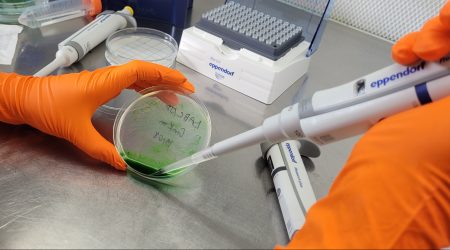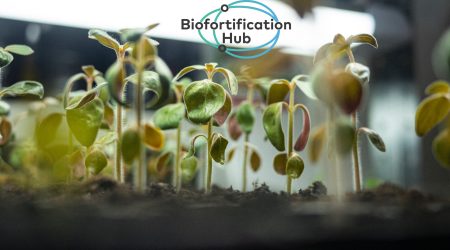Growing Influence: The John Innes Centre’s impact on the UK and Global Economy is on the rise

An assessment of the John Innes Centre’s socio-economic impact highlights substantial contributions to both the UK and global economy, with over £15 returned to the UK economy for every £1 invested in research.
Socio-economic impact has been quantified in an independent report which highlights our position as a global leader in bioscience research, training, and innovation. In total the John Innes Centre is expected to contribute £11.2 billion to the global economy over the next decade, and £54 billion over the next 25 years.
The report highlights that our research has a direct impact on global food security, and with the global population expected to reach nine billion by 2050 this is vitally important. Our work to improve wheat and oilseed rape yields and mitigating the impact of temperature in brassicas is crucial for ensuring food security in a changing climate.
Considering the significance of wheat as a global crop, and our role in co-ordinating the UK’s strategic wheat programme, the report projects our contribution to this research to be worth £496 million in the UK, and £21 billion worldwide over the next 25 years.
The UK’s strategic wheat research programme has led to a range of tools which can now be used to accelerate the genetic improvement of this staple crop, from speed breeding, rapid gene discovery to researching how we can produce hybrid wheat to increase yield.
Our bioscience research focusses on understanding biological systems and we aim to translate these finding to impact sustainable food supply, improved health outcomes, and global socio-economic growth.
The John Innes Centre is ranked in the top 10 institutions in the world by patent influence1.
To assess our socio-economic impact, Brookdale Consulting produced an assessment report in 2022. Using case studies from across our patent portfolio and research, the independent analysis calculated the future impacts that could emerge over the next 10, 15 and 25 years.
In addition to our impact on globally significant crops, we also have impact in healthcare with research to ensure that people stay healthier for longer. As the proportion of UK citizens living beyond 65 increases dramatically, our fundamental bioscience research on topics including resistant starch and Type-2 diabetes and antibiotics.
Our work also has impact with the discovery and production of high-value compounds as novel therapeutic drugs and preventative medicines, which are critical to enabling people to stay healthy and active for longer.
We support industry to develop renewable, ‘low carbon’, chemicals and compounds using plant and microbe -based technologies, which have the potential to revolutionize the renewable energy, pharmaceutical and chemical industries. By developing high-value products from plants, such as adjuvants and drugs we can support improving extraction sustainability.
Finally, our extensive training and education activities also have significant impact and are estimated to contribute £89 million to the UK economy over the next decade.
Key Stats and Facts
- Return on investment (RoI) increased to £15.29 per £1 invested, based on a sample of commercialisation projects and research costs.
- JIC is expected to contribute £11.2 billion to the global economy over the next decade, and £54 billion over the next 25 years.
- Our involvement in strategic wheat research is estimated to be worth £496m in the UK, and £21bn globally over the next 25 years.
- We support 881 jobs in the UK economy.
- JIC’s extensive training activities are estimated to contribute £89m to the UK economy over the next decade and £49m internationally.
- In 2022 JIC was ranked among the top 10 institutions in the world by patent influence1.
Read the John Innes Centre’s Impact Report 2022
1 https://www.nature.com/nature-index/supplements/nature-index-2022-innovation/tables/overall
— ENDS –—
Notes for Editors
Contact: Felicity Perry, Head of Communications and Engagement, 07881 255 193, felicity.perry@jic.ac.uk
About the John Innes Centre
The John Innes Centre is an independent, international centre of excellence in plant science, genetics and microbiology. Our mission is to generate knowledge of plants and microbes through innovative research, to train scientists for the future, to apply our knowledge of nature’s diversity to benefit agriculture, the environment, human health, and wellbeing, and engage with policy makers and the public.
We foster a creative, curiosity-driven approach to fundamental questions in bio-science, with a view to translating that into societal benefits. Over the last 100 years, we have achieved a range of fundamental breakthroughs, resulting in major societal impacts. Our new vision Healthy Plants, Healthy People, Healthy Planet (www.hp3) is a collaborative call to action. Bringing knowledge, skills and innovation together to create a world where we can sustainably feed a growing population, mitigate the effects of climate change and use our understanding of plants and microbes to develop foods and discover compounds to improve public health.
The John Innes Centre is strategically funded by the UKRI-BBSRC (Biotechnology and Biological Sciences Research Council), and is supported by the John Innes Foundation through provision of research accommodation, capital funding and long-term support of the Rotation PhD programme.
For more information about the John Innes Centre visit our website www.jic.ac.uk.



